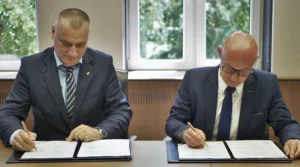What goes on in Poland on the 7th of December.
In the Polish pavilion at the COP24 climate summit, a report by the Polish Electricity Association presenting the course of changes in the Polish power industry over the last 30 years has been presented and commented by deputy minister of energy Grzegorz Tobiszowski and Yvon Slingenberg from the directorate general for climate action at the European Commission.
Tobiszowski: Poland is changing its energy sector as much as it can
Tobiszowski pointed out that it is worth showing the recent achievements of the Polish power industry: – Poland as a community gives expression to care for the climate. We have ambition to create a discussion about the climate in the spirit of international solidarity. Poland presents concrete achievements in a fair energy transformation. The PKEE report shows the historical and technological path to the current state of the Polish power industry and how we can contribute to reducing the impact on the environment and ensuring energy security. Historical and geographical conditions have directed the Polish energy industry to some sources – said the deputy minister.
Tobiszowski added that the reduction does not only apply to CO2, but also to other chemicals and substances affecting the quality of air in Poland: – So far, the results achieved include a 30 percent reduction in energy intensity, an increase in RES share, low energy dependency ratio and GDP growth with emission reduction. We have made good use of time and can be an example for countries that face similar challenges. The planned energy mix shows that we retain the volume of raw material, but we measure the percentage of climate challenges. We have implemented many capital-intensive investments to increase energy efficiency due to environmental pressure. Poland did it not as a developed country but as a country changing the whole system. This explains the current state of the mix – he said. He also drew attention to the necessity of increasing investments in energy efficiency and sovereignty in shaping the energy mix.
Slingenberg: Absorbtion by forests is not enough
Yvon Slingenberg from the Directorate General for Climate at the European Commission said that climate change is an undeniable fact. – In some parts of the world, some people ignore it, but not here in Europe. We are exposed to these changes, we have to adapt to them, the costs of this adaptation will grow. If we do not do this, serious economic and social consequences await us. By 2030, we want to reduce emissions by 40 percent compared to 1990. We need to accelerate change and aim for a zero-emission economy in 2050 to stop the global temperature increase of 1,5 degrees Celsius – Slingenberg said.
She also added that the implementation of climate objectives will contribute to increasing energy efficiency, modernizing buildings, increasing the role of renewable energy, while maintaining jobs. – The changes will also affect agriculture. Absorbing through forests will be important, but it will not solve the problem of CO2 emissions itself – said Slingenberg.








